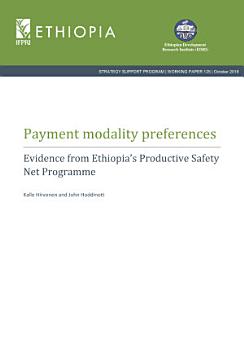Payment modality preferences: Evidence from Ethiopia’s Productive Safety Net Programme
Hirvonen, Kalle · Hoddinott, John F.
Okt 2018 · ESSP Working Paper Kitabu cha 125 · Intl Food Policy Res Inst
5.0star
Maoni mojareport
Kitabu pepe
25
Kurasa
family_home
Kimetimiza masharti
info
reportUkadiriaji na maoni hayajahakikishwa Pata Maelezo Zaidi
Kuhusu kitabu pepe hiki
Economists typically default to the assumption that cash is always preferable to an in-kind transfer. We extend the classic Southworth (1945) framework to predict under what conditions this assumption holds. We take the model to longitudinal household data from Ethiopia where a large-scale social safety net intervention – the Productive Safety Net Programme (PSNP) – operates. Even though most PSNP payments are paid in cash, and even though the (temporal) transaction costs associated with food payments are higher than payments received as cash, the overwhelming majority of the beneficiary households prefer their payments only or partly in food. However, these preferences are neither homogeneous nor stable. Higher food prices induce shifts in preferences towards in-kind transfers, but more food secure households and those closer to food markets and to financial services prefer cash. There is suggestive evidence that preferences for food are also driven by self-control concerns.
Ukadiriaji na maoni
5.0
Maoni moja
Kadiria kitabu pepe hiki
Tupe maoni yako.
Kusoma maelezo
Simu mahiri na kompyuta vibao
Sakinisha programu ya Vitabu vya Google Play kwa ajili ya Android na iPad au iPhone. Itasawazishwa kiotomatiki kwenye akaunti yako na kukuruhusu usome vitabu mtandaoni au nje ya mtandao popote ulipo.
Kompyuta za kupakata na kompyuta
Unaweza kusikiliza vitabu vilivyonunuliwa kwenye Google Play wakati unatumia kivinjari cha kompyuta yako.
Visomaji pepe na vifaa vingine
Ili usome kwenye vifaa vya wino pepe kama vile visomaji vya vitabu pepe vya Kobo, utahitaji kupakua faili kisha ulihamishie kwenye kifaa chako. Fuatilia maagizo ya kina ya Kituo cha Usaidizi ili uhamishe faili kwenye visomaji vya vitabu pepe vinavyotumika.










